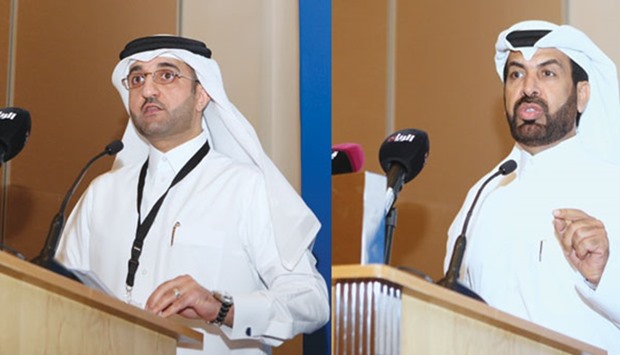The Qatar Stock Exchange (QSE), which has witnessed “tremendous” capital inflows from the passive fund managers after its upgrade to emerging market, has potential for a higher weightage in the MSCI compared to the present 0.8%, according to its top official.
Moreover, active funds, which are still “significantly” underweight on Qatar, could act as a trigger towards Qatar achieving a higher weightage in the global index compiler’s emerging market portfolio, QSE listing director Abdulaziz al-Emadi hinted yesterday.
“We have tremendous capital inflows from passive asset managers who track these indices regularly. We are currently at 0.8% of the MSCI emerging market index and passive investors tracking these indices are worth $210bn,” he told the 7th Annual Qatar Investor Relations conference, jointly held by the QSE and the Middle East Investor Relations Association (Meira).
The active fund manager’s community, which is not compelled to follow the index, is currently “significantly underweight” on Qatar, “less underweight” on the UAE and “overweight” on Egypt, he said, highlighting that Qatar and Dubai are presently 90% and 50% underweight respectively, while Egypt is 10% overweight.
“Can you imagine if we reach just 2% of this (weight)? And active fund managers which are five times bigger should follow,” he said, adding in the run-up to emerging market inclusion, the QSE had qualified many companies to join the MSCI, FTSE and S&P indices.
The optimism on higher weightage stems from higher foreign ownership limits (FOL) and liquidity in the listed companies.
So far, Nakilat, Milaha, Ezdan Real Estate, Qatar Insurance, Commercial Bank, Aamal Company, Qatar General Insurance and Reinsurance, Doha Bank, al khaliji and Gulf Warehousing have received approval from the Qatar Central Securities Depository to enhance the FOL up to 49%.
Earlier delivering his keynote address, QSE chief executive Rashid bin Ali al-Mansoori stressed the significant role of IRs (investor relations) on the performance of listed companies and the promotion of effective communication with shareholders and investors.
“We encourage listed companies in Qatar to develop their investor relations standards and adopt best international practices in this area,” he said, adding “we are ahead of others, but more progress must be achieved in this area, especially in light of economic and geopolitical conditions.”
Highlighting that investors are attracted to entities focusing on IRs, he said this highlights importance of IR in keeping all the stakeholders in the investment equation aware of the company’s business plans, strategies, and investment trends through the use of technology and effective communication.
Highlighting that the QSE has been actively working on various initiatives to improve the IR activities for its listed companies, al-Emadi said in today’s complex environment, there is a need to develop a strategy that is in line with the company’s overall strategic plan. IR is a strategic function which helps companies raise awareness within global investment community, access to capital, achieve fair valuation, and increase liquidity, he added.
The use of technology in the IR field has grown dramatically in recent years. There are several means of communications for keeping investors and analysts informed and so too are conference calls, results webcasts and video-link meetings, he said.

Al-Emadi and al-Mansoori: Tremendous capital inflows.

